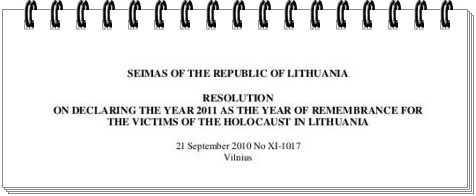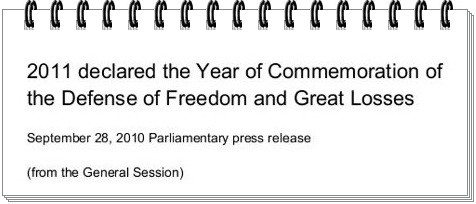One week ago today, on 21 September 2010, this journal reported on a document released by various Lithuanian embassies on the ‘Resolution of the Republic of Lithuania on Declaring the Year 2011 as the Year of Remembrance for the Victims of the Holocaust in Lithuania’ (read document here).
In addition to ‘condemning the genocide perpetrated against Jews by Nazis and their collaborators in Lithuania’ the resolution pledges itself to ‘honoring the residents of Lithuania who fought against Fascism’. [In its report, HITB naturally asked for immediate action to halt the kangaroo investigations of Holocaust Survivors who did just that; to dismantle antisemitic exhibits in state museums; and to halt the campaign for the ‘Double Genocide’ model of history in Europe.]
At the solemn September 21st ceremony at the mass murder site Ponar (Paneriai), member of parliament Emanuelis Zingeris informed the assembled diplomats, citizens and visitors that the Seimas had unanimously approved the resolution and that 2011 would be dedicated to Holocaust commemoration, a most appropriate gesture, on the 70th anniversary of 1941, when nearly all of Lithuanian Jewry was annihilated by the Nazis, with the massive participation of local nationalist forces who are on occasion glorified in modern Lithuania as ‘anti-Soviet partisan heroes’ (see e.g. the Genocide Museum’s narrative).
Many of the assembled at Ponar went away believing that the Seimas had turned a new page in the country’s perception of its Holocaust history.

But today, one week later, September 28th, the Seimas announced the following ‘slightly revised’ version of its plan for the focus of 2011: ‘Parliament announces 2011 as year of freedom defense, memory of great losses in Lithuania’ (as per the text of BNS’s report in English here). The parliament’s own official statement is here; full English translation here, with the corrected English title: ‘Year of Commemoration of the Defense of Freedom and Great Losses’.
 Frankly, there is unease in the Jewish community as to whether this title and text leave open the possibility that the LAF (Lithuanian Activist Front) and PG (Provisional Government), both massively complicit in the early stages of the Lithuanian Holocaust, are going to be celebrated as ‘defenders of freedom’ (or anti-Soviet patriots) during the 2011 seventieth anniversary of events unleashed by Hitler’s invasion of 22 June 1941.
Frankly, there is unease in the Jewish community as to whether this title and text leave open the possibility that the LAF (Lithuanian Activist Front) and PG (Provisional Government), both massively complicit in the early stages of the Lithuanian Holocaust, are going to be celebrated as ‘defenders of freedom’ (or anti-Soviet patriots) during the 2011 seventieth anniversary of events unleashed by Hitler’s invasion of 22 June 1941.
See the Lithuanian Jewish Community’s recent public statement released earlier this month, and, for samples of documents from the LAF and PG, the relevant pages in Joseph Levinson’s 2006 Shoah in Lithuania (4 meg PDF here; low res here).
The Jewish community’s unease was further exacerbated today by a statement made to the parliament by Birute Burauskaite, director general of the Genocide Research Center. BNS’s report in English.
In the worst traditions of avoiding the simple truth about the slaughter of two hundred thousand Lithuanian Jews, she chose to target the Association of Lithuanian Jews in Israel, one of the last active associations of Litvaks in the world, over a list of alleged Holocaust perpetrators previously on its website. She goes on to dress up the Genocide Center’s academically clothed whitewash of the killers and their collaborators as a purportedly sophisticated computer-model for determining who could have participated in the genocide…
The more detailed Delfi.lt report (full English translation here) reveals the director-general of the state-financed Genocide Center speaking to parliament not in the voice of a scholar, researcher or educator, nor in the voice of a patriot concerned for historic justice for all her country’s citizens, but in the ultranationalist politician’s voice of us [‘the ethnic majority’] and them [‘the Jews’]. Among the gems: ‘If our opponents begin to criticize and say that we here are lowering that number’ (…) [emphasis added — HITB].
Among the tiny remnant Jewish community here, dark Litvak humor quickly had its spontaneous response: ‘They will soon determine that two hundred thousand people shot themselves’.
It is widely thought that this report to the parliament from the director of the Genocide Center was planned to coincide with the parliament’s statement about the plans for 2011, as a political signal that the ‘Fascists of 1941’ are being cleansed, laundered and sanctified in preparation for their glorification on the occasion of the 70 anniversary commemorations of Hitlerism’s arrival here, due in 2011.
Without once mentioning the Holocaust as an event worthy of inclusion among the ‘great losses of 1941’, today’s parliamentary resolution, overwhelmingly passed with 71 for, none against, and two abstentions, details the following as the content of the special 2011 commemorative year: history of restoration of statehood; the deportation of 30,000 people in 1941; the killing of 14 people during the Soviet attempt to take over the Lithuanian Radio and Television Building on 13 January 1991.
It seems that yet again, persuasive voices were able to convince legislators to do the wrong thing: to come up with one version ‘for the diplomats, the naive foreigners and the Jews’, and another ‘for Lithuania’ and the far-right coalition in the European Parliament that seeks to enact the Prague Declaration and similar legislation.
The duplicity itself does the country grave damage, as does the erosion of freedom of open debate that has of late silenced much criticism by enactment of a law this year that threatens up to two years’ jail time for those who would disagree with the notion of Soviet genocide in Lithuania (i.e. those who believe the Holocaust to have been a unique instance of genocide in the country).
Report in Jerusalem of Lithuania (publication of the Jewish Community of Lithuania).